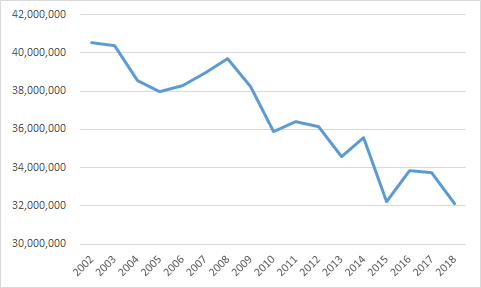Drop in MBTA Commuter Rail Ridership Continues
A recent Boston Globe column by Northeastern University Professor Joseph M. Giglio and our own Charlie Chieppo has drawn the ire of some transit advocates. In it, Giglio and Chieppo argue that commuter rail trains that provide station-to-station service are poorly positioned to compete with shared, electric, self-driving cars, when they become dominant several decades from now.
The advocates seem to have seized on the fact that the authors wrote that MBTA commuter rail ridership is down, and they assert that it has actually spiked in recent years. But that claim seems to be based more on wishful thinking than fact.
The official standard for ridership statistics is the National Transit Database (NTD), which contains data reported by transit agencies to the Federal Transit Administration upon which federal reimbursements to local transit agencies are based. These data, which cover January 2002 through December 2018, show that MBTA commuter rail ridership has fallen by more than 25 percent, from 40.57 million in 2002 to 32.14 million in 2018. In fact, 2018 commuter rail ridership was the lowest of any year in the 2002-2018 period. According to NTD data for calendar year 2012, the MBTA commuter rail ridership declined from 36.13 million in 2012 to 32.14 million in 2018, an 11 percent drop over the last six years.
Figure 1. MBTA commuter rail trips per year 2002 – 2018 (NTD data)[i]

Figure 2. MBTA commuter rail trips per year 2002 – 2018 (NTD data)
| Year | Passenger Trips |
| 2002 | 40,569,600 |
| 2003 | 40,363,600 |
| 2004 | 38,569,700 |
| 2005 | 37,975,600 |
| 2006 | 38,309,700 |
| 2007 | 38,961,600 |
| 2008 | 39,721,400 |
| 2009 | 38,258,800 |
| 2010 | 35,866,269 |
| 2011 | 36,429,353 |
| 2012 | 36,134,746 |
| 2013 | 34,571,932 |
| 2014 | 35,560,409 |
| 2015 | 32,244,598 |
| 2016 | 33,857,423 |
| 2017 | 33,748,866 |
| 2018 | 32,143,251 |
MassDOT presented a report to the Fiscal and Management Control Board on January 28, 2018 that lent credence to the accuracy of NTD data. The report explained that the Central Transportation Planning Staff (CTPS) of the Boston Region Metropolitan Planning Organization had conducted a series of one-day manual commuter rail passenger counts at all MBTA stations between April and June 2018. [i] MassDOT annualized the data and reported that CTPS’s commuter rail ridership estimate for FY 2018 was very similar to the ridership numbers reported by NTD, which are manual counts reported by train conductors. According to NTD data, the MBTA had 32,859,741 annual commuter rail trips in FY2018; the CTPS data translated to 32,753,615 trips, a difference of less than a third of 1 percent.
CTPS passenger counts totaled 126,754 commuter rail trips per ordinary weekday between April and June of 2018. The MassDOT report cited that CTPS had conducted a series of one-day manual commuter rail passenger counts in 2012 that reported average typical weekday ridership of 104,574 between January and June 2018, pointing out that that the 2018 CTPS ridership counts were 21.2 percent higher than CTPS’s 2012 counts, but also acknowledging that “NTD data since 2012 shows a downward trend.” [ii]
The problem with this conclusion is that CTPS dramatically undercounted the 2012 ridership data. In a December 2012 memo to MassDOT, (see link below), CTPS’ chief planner wrote:
Due to the need to complete all of the CTPS counts between January 2012 and July 1, 2012, when the new fares were implemented, counts on some rail lines had to be done when ridership was expected to be lower than normal. In particular, temporary schedules on the Old Colony and Greenbush lines required by a tie replacement project and on the Fairmount Line by bridge replacement work are believed to have reduced the ridership on those lines.
The memo went on to note that “Comparisons of the May 2011 audit figures with the CTPS 2012 counts at the station level show no set pattern in their ratios. The CTPS counts exceeded the audit figures at a few stations, but overall the audit totals exceeded the CTPS inbound counts by 42.6%.”[iii] The audits referred to in the memo are “Train Audits” that the Federal Transit Agency requires to be submitted by transit agencies to report passenger trips.
The bottom line is that MBTA commuter rail ridership declined to a 17-year low in 2018, according data published by the Federal Transit Agency in the National Transit Database. The CTPS 2018 survey backed up the reliability of this NTD data. Critics won’t get far by relying on 2012 passenger count data that the Central Transportation Planning Staff itself admitted is flawed and that drastically undercounted ridership.
At Pioneer, our view of the future of commuter rail is that the system must change dramatically to position itself to compete with the onslaught of automated vehicles. If we succeed, it can be an important part of the overall portfolio of transportation options. If we are unwilling to rethink the service, changing cost and quality realities will make commuter rail options unattractive.
[i] https://www.transit.dot.gov/sites/fta.dot.gov/files/December%202018%20Adjusted%20Database.xlsx
[ii] https://cdn.mbta.com/sites/default/files/fmcb-meeting-docs/2019/01-january/2019-01-28-fmcb-commuter-rail-ridership-original.pdf
[iii] https://www.ctps.org/commuter_rail_counts; https://www.ctps.org/data/pdf/studies/transit/2012_MBTA_Commuter_Rail_Passenger_Counts/MBTA_Commuter_Rail_Passenger_Count_Results.pdf
[iv]https://www.ctps.org/data/pdf/studies/transit/2012_MBTA_Commuter_Rail_Passenger_Counts/MBTA_Commuter_Rail_Passenger_Count_Results.pdf



